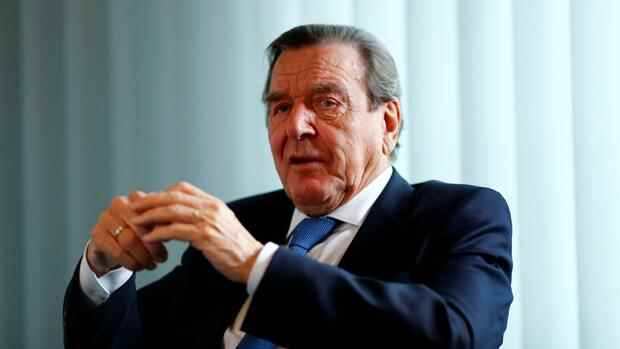The former chancellor has accused Ukraine of “saber rattling” in the conflict with Russia.
(Photo: Reuters)
Berlin The debate about the position of the SPD and Chancellor Olaf Scholz in the Ukraine conflict is intensifying. The CDU foreign policy expert Norbert Röttgen clearly criticized the statements made by former Chancellor Gerhard Schröder (SPD) on Ukraine.
Röttgen said on Deutschlandfunk: “Gerhard Schröder talks like a paid employee of Putin and the Kremlin.” Blaming Ukraine says it all. “It’s not to be taken seriously anymore and it’s just shameful.”
The SPD also distanced itself from the former chancellor. “Many can express themselves, but as the current SPD leadership, we make decisions together with Chancellor Olaf Scholz,” said co-party leader Lars Klingbeil in the ARD “Morgenmagazin”.
Schröder had accused Ukraine of “saber rattling” in the conflict with Russia. The former chancellor has been close friends with Vladimir Putin since his chancellorship (1998 to 2005). In 2005, Schröder took on managerial responsibilities in the Russian energy industry and today chairs the supervisory boards of two Russian state-owned companies.
Top jobs of the day
Find the best jobs now and
be notified by email.
Regardless of Schröder’s controversial statements, the federal government led by the SPD has come under increasing international criticism for its actions in the Ukraine crisis.
Germany is accused of not putting enough pressure on Russia during the crisis. Chancellor Scholz had long hesitated to use the controversial Nord Stream 2 gas pipeline as a sanctions instrument in the event of war.
At the invitation of SPD leader Klingbeil, leading Social Democrats are meeting in Berlin this Monday for confidential consultations to discuss the party’s course on the Russia question.
Union at odds over arms shipments
Klingbeil countered the impression that the government and the SPD were at odds and stressed that it was “completely clear” that the escalation came from Russia. All options are on the table.
“But we are also clear that the task now is to organize peace,” says Klingbeil. “I don’t want us now, through threats, through actions, to get into a situation in which suddenly – perhaps unintentionally – a war situation arises in Europe.”
Regarding the proposal by the former SPD leader and ex-Foreign Minister Sigmar Gabriel for an open discussion about arms deliveries to Ukraine, Klingbeil said he was fundamentally convinced that arms deliveries would not help in the current situation. Rather, it is correct that Scholz and Foreign Minister Annalena Baerbock (Greens) are now leading the way in order to develop diplomatic initiatives from the heart of Europe. “Olaf Scholz has full support there.”
The CDU foreign politician Röttgen supports this course. Arms deliveries to Ukraine are “morally and politically justifiable”. However, in the case of Germany, that would mean “that what we have in the way of special dialogue, of special channels of communication with Moscow, would be destroyed.”
The politician considers arms deliveries to be justifiable, but they would damage the dialogue between Germany and Moscow.
(Photo: dpa)
That is a “price that is too high, it is of no use to anyone”. More important are economic sanctions, such as stopping the Nord Stream 2 Baltic Sea pipeline in the event of Russian troops invading Ukraine. There should be no doubt about Germany here.
The CDU politician Henning Otte, on the other hand, sees arms deliveries to Ukraine as a possible option “if this appears necessary within NATO and the European Union”. For the defense politician, however, the stationing of soldiers in eastern Ukraine under a UN mandate is not a suitable means of preventing a military conflict.
It is about providing moral support to the government and the people of Ukraine, but also strengthening them with equipment if necessary. “It’s not about sending combat troops,” Otte told Phoenix.
More: Dialogue instead of sanctions – The German political elite and those who understand Putin
